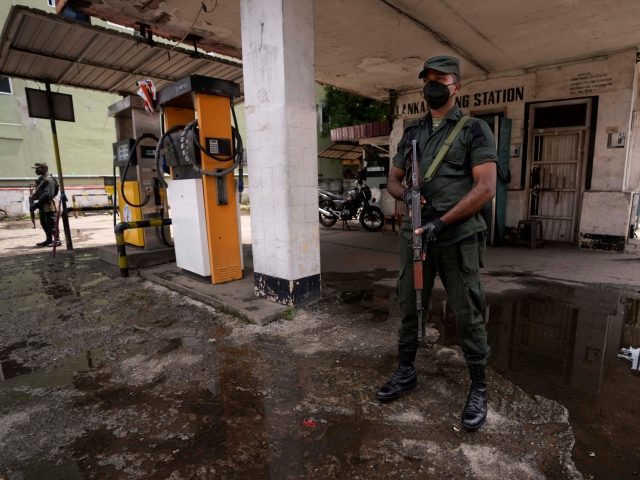Soldiers in Sri Lanka opened fire this weekend in response to at least two situations in which mobs formed around gasoline stations, either seeking to buy fuel or protesting the shortages.
The Sri Lankan military issued a statement about the larger incident in northeast Mullaitivu, claiming that a “drunk” and angry mob had formed around a gasoline station and began hurling bottles and other projectiles as members of the armed forces.
Long lines at gas stations, widespread protests, mob violence, and clashes with police have become a regular occurrence in the Democratic Socialist Republic of Sri Lanka this year as the island nation ran out of fuel, electricity, food, and medicine, largely the result of devastating economic mismanagement under the ruling Rajapaksa dynasty. Sri Lankan officials urged citizens not to bother getting in gasoline lines until June 23 because the country had simply run out of fuel.
The Rajapaksa family, which at one time held as many as 40 government posts, currently only controls the presidency after ceaseless protests resulted in the resignation of Prime Minister Mahinda Rajapaksa and several other Rajapaksas in the cabinet.
Under current President Gotabaya Rajapaksa, the Sri Lankan Defense Ministry issued orders in May to shoot “all those who plunder public property or cause personal harm” on sight. Reports from the weekend indicated, however, that soldiers shot into the air to disperse the mobs.
One incident, according to Sri Lanka’s Daily Mirror newspaper, occurred on Sunday in Kalutara southwestern Sri Lanka.
“The military fired warning shots to douse a tense situation at a filling station in the Meegahathenna area in Kalutara yesterday, the police said,” according to the Mirror. “Tension erupted after a person tried to break a petrol line. The military personnel on duty opened fire into the air to disperse the crowd.”
The larger incident in Mullaitivi occurred late on Saturday. Sri Lanka’s News First narrated that police attempted to arrest a man for “obstructing” the duties of soldiers on a fuel line.
“Subsequently, a group of people who had gathered near the Army checkpoint demanding the release of the suspect had obstructed the duties of Army officers and assaulted them with glass bottles,” News First relayed. “After this, additional troops were deployed at the location to bring the situation under control, and they have fired gunshots into the air. Seven people, including three army personnel were injured in the incident, Police stated.”
Reports indicated that the mob involved in the incident included about 20 or 30 people.
Tense situation reported at a fuel station in Vishwamadu.
According to reports gun shots were also fired by the security forces during the incident in an attempt to control the situation. #News #SL pic.twitter.com/wnPh6Jjuay— DailyMirror (@Dailymirror_SL) June 18, 2022
The Sri Lanka Army issued a statement on Sunday insulting the mob, calling them “drunkards” and insisting that firing warning shots was a necessary and appropriate measure.
“An orchestrated attempt by an unruly mob, most of who were confirmed drunk, to provoke Army personnel manning a guard point in Vishwamadu area in Mullaittivu was thwarted,” the statement read, “by firing several warning shots to the air after those drunkards began pelting glass bottles and stones at Army personnel on duty around 8.00 pm on Saturday (18).”
The statement claimed only two arrests despite the size of the crowd.
Sri Lankan outlet Ada Derana reported that the military claimed the mob scene was “a deliberate attempt by some suspicious elements to sabotage the goodwill and the cooperation that prevail between members of the Security Forces and the general public.”
Protests continued on Monday demanding President Rajapaksa resign, including one featuring the president in effigy being dragged through the streets.
An effigy of President Gotabaya Rajapaksa dragged along the street in Fort. #DailyMirror #SriLanka #SLnews pic.twitter.com/SUCDc5zkeV
— DailyMirror (@Dailymirror_SL) June 20, 2022
Ada Derana reported 21 arrests on Monday, including that of a Buddhist monk, in the capital city of Colombo after a mob surrounded the Finance Ministry headquarters. The protest involved blocking the building’s entrance, including with tents, and disrupting the ongoing activities of the government agency. Of utmost importance was a meeting between Finance Ministry officials and the International Monetary Fund (IMF) to discuss aiding Sri Lanka in addressing its economic crisis. Protesters delayed the meeting by preventing members of the IMF and the Sri Lankan government from entering.
At least ten people have died waiting in line for some form of fuel since March. Two men died last week after collapsing. Some victims are believed to have died of heat stroke or heart failure.

COMMENTS
Please let us know if you're having issues with commenting.